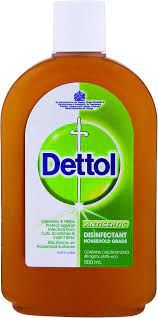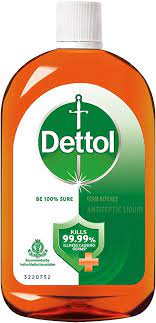Dettol Antiseptic: A Trusted Guardian in Germ Protection
Dettol Antiseptic, a household staple for generations, is a powerful and versatile disinfectant trusted to eliminate harmful germs and bacteria. With its unique formulation containing active ingredients like chloroxylenol, it offers effective protection in various applications, from wound care to surface disinfection. Dettol Antiseptic is your reliable companion in maintaining hygiene and safeguarding against infections, making it an essential part of every home.
Introduction

In an era where health and hygiene have become paramount, the significance of reliable antiseptic solutions cannot be overstated. Dettol Antiseptic, a household name for generations, has been a trusted companion in safeguarding our health by eliminating harmful germs and bacteria. This article delves into the depths of Dettol Antiseptic, exploring its history, composition, uses, and the science behind its effectiveness. With over eight decades of trust, Dettol has carved a niche for itself as a steadfast guardian against infection and illness.
A Journey Through Time: The History of Dettol Antiseptic
Dettol's story begins in the early 20th century when it was first developed by Reckitt & Sons, a British company, in 1932. Initially, Dettol was introduced as a surgical antiseptic to disinfect and protect the skin from germs and bacteria. Over the years, it evolved from a medical product into a household brand, offering a wide range of antiseptic products, including liquid disinfectant, soap, hand sanitizers, and surface cleaners.
Versatile Applications of Dettol Antiseptic
Dettol Antiseptic is renowned for its versatility and can be employed in a myriad of ways to promote hygiene and prevent the spread of infections:
a. Wound Disinfection: Dettol's initial use as a surgical antiseptic continues to this day. It is ideal for cleansing and disinfecting wounds, cuts, and grazes to prevent infections.
b. Surface Disinfection: Dettol can be diluted with water and used to clean and disinfect surfaces, including kitchen countertops, bathroom fixtures, and even children's toys.
c. Personal Hygiene: Dettol's range includes antiseptic soaps and hand sanitizers that help individuals maintain proper hand hygiene, protecting against illnesses such as the common cold and flu.
d. Laundry Disinfection: Adding a small amount of Dettol Antiseptic to your laundry can help eliminate germs and bacteria present in clothing and linens.
e. Air Purification: Dettol can also be used as an air purifier. By adding a few drops to a bowl of water and placing it in a room, it can help disinfect the air, making it particularly useful during cold and flu seasons.
The Science Behind Dettol's Effectiveness
The efficacy of Dettol Antiseptic is rooted in its ability to disrupt the cell membranes of microorganisms, ultimately leading to their destruction. When Dettol comes into contact with bacteria, viruses, or fungi, it breaks down their lipid (fat) membranes, rendering them incapable of functioning. This mode of action is effective against a wide range of pathogens, making Dettol a reliable choice for disinfection and hygiene.
Safety Considerations
While Dettol is highly effective, it is important to use it with care. Here are some safety considerations to keep in mind:
a. Dilution: When using Dettol for wound disinfection or as a surface cleaner, it should be diluted according to the instructions on the packaging. Using it undiluted can be too harsh and may cause skin irritation.
b. Avoid Ingestion: Dettol should never be ingested. It is not intended for internal use and can be harmful if consumed.
c. Allergies: Some individuals may be sensitive to the active ingredients in Dettol. If you experience skin irritation or other adverse reactions, discontinue use and seek medical advice.
d. Keep Out of Reach of Children: Dettol should be stored out of the reach of children to prevent accidental ingestion or misuse.
Dettol in the Global Fight Against Pandemics
Dettol has played a vital role in numerous public health initiatives and campaigns worldwide. During the COVID-19 pandemic, for instance, Dettol's hand sanitizers became essential in maintaining proper hand hygiene to prevent the spread of the virus. The brand actively promoted the importance of handwashing and sanitizing, contributing to global efforts to curb the pandemic.
Consumer Trust and Loyalty
Dettol's long history and its consistent performance have earned it a special place in the hearts of consumers. Many individuals and families have grown up with Dettol products, instilling a sense of trust and reliability. The brand's commitment to quality and safety has solidified its position as a trusted guardian in the realm of hygiene.

Components of Dettol Antiseptic
Dettol disinfectant is a widely recognized and trusted product known for its ability to kill germs and bacteria, making it an essential tool for maintaining hygiene and cleanliness in various settings. The basic components of Dettol disinfectant include:
- Active Ingredient: Chloroxylenol (C8H9ClO): Chloroxylenol is the primary active ingredient in Dettol disinfectant. It is a chemical compound known for its strong antimicrobial properties. Chloroxylenol is effective against a broad spectrum of microorganisms, including bacteria, viruses, and fungi. It disrupts the cell membranes of these pathogens, leading to their destruction. This compound is responsible for Dettol's ability to disinfect and kill germs effectively.
- Solubilizing Agent: Pine Oil: Pine oil is a secondary component in Dettol disinfectant. It serves as a solubilizing agent, helping to disperse the chloroxylenol in water. Pine oil not only aids in the even distribution of the active ingredient but also imparts a pleasant and refreshing fragrance to the product. This component is responsible for Dettol's distinctive aroma.
- Water: Dettol disinfectant contains water as the primary solvent. Water is used as a carrier for the active ingredient (chloroxylenol) and the solubilizing agent (pine oil). This allows for the even dispersion of these components and ensures the product can be easily applied to various surfaces and skin.
- Emulsifiers and Stabilizers: Emulsifiers and stabilizers may be added to Dettol disinfectant to maintain the stability of the product and ensure that the active ingredient and solubilizing agent remain well mixed and effective.
- Fragrance: To make the product more appealing, Dettol disinfectant often includes fragrances. The fragrance, primarily derived from the pine oil and other added fragrances, helps mask the medicinal odor of chloroxylenol and provides a clean and fresh scent when the product is used.
- Colorants: Some variations of Dettol disinfectant may include colorants to give the solution a distinctive color. While the color does not affect the product's disinfecting properties, it helps users identify the type of Dettol product they are using, such as the classic brownish-red color of Dettol. It's important to note that the specific formulation of Dettol disinfectant may vary depending on the product's intended use and regional regulations. Users should always follow the usage instructions provided on the product packaging to ensure effective and safe disinfection.
Merits of being a Dettol Antiseptic User
Being a Dettol Antiseptic user comes with a range of benefits, as this product has been trusted and used for decades to promote hygiene, disinfect surfaces, and protect against the spread of germs and infections. Here are some of the key benefits of being a Dettol Antiseptic user:
- Effective Germ Protection: Dettol Antiseptic is known for its potent antimicrobial properties. It can kill a wide range of bacteria, viruses, and fungi. As a user, you can have confidence in its ability to effectively protect you and your family from harmful germs and infections.
- Versatile Applications: Dettol Antiseptic can be used in various ways, making it a versatile addition to your household. You can use it for wound disinfection, surface cleaning, personal hygiene, laundry disinfection, and even air purification. Its adaptability means you can rely on it for various needs.
- Wound Care: Dettol Antiseptic is ideal for cleansing and disinfecting minor wounds, cuts, grazes, and insect bites. It helps prevent infections and aids in the healing process, promoting overall health and well-being.
- Surface Disinfection: With Dettol, you can effectively disinfect surfaces in your home, such as kitchen countertops, bathroom fixtures, and frequently touched objects. This helps reduce the risk of cross-contamination and illness transmission within your household.
- Hand Hygiene: Dettol offers a range of hand sanitizers and soaps that make it easy to maintain proper hand hygiene, which is crucial for preventing the spread of illnesses, especially during flu seasons and disease outbreaks.
- Laundry Disinfection: Adding a small amount of Dettol Antiseptic to your laundry can help eliminate germs and bacteria present in clothing and linens. This is particularly useful for maintaining the cleanliness of items that come into close contact with your skin.
- Air Purification: Dettol can also be used to help purify the air. By placing a bowl of water with a few drops of Dettol in a room, you can help reduce the presence of airborne germs and promote a cleaner breathing environment.
- Public Health Support: Dettol has been actively involved in public health campaigns, especially during pandemics like the COVID-19 outbreak. The brand's products, such as hand sanitizers, played a crucial role in promoting proper hygiene and limiting the spread of infectious diseases.
- Trusted Brand: Dettol has a long history and a track record of reliability. Being a Dettol user means you are associated with a brand that has earned the trust of consumers for generations. This trust is a testament to the brand's commitment to quality and safety.
- Peace of Mind: Using Dettol Antiseptic provides peace of mind. Whether you're cleaning your home, caring for a minor injury, or simply practicing good hygiene, you can have confidence in the product's effectiveness and the protection it offers.
- Safety: Dettol Antiseptic is generally safe when used as directed. It is carefully formulated to provide germ protection while minimizing the risk of harm. However, it's important to follow the usage instructions and take safety precautions to ensure a safe experience.

In a world where infectious diseases are a constant concern, Dettol Antiseptic serves as a reliable companion in your efforts to maintain good health and hygiene. Its long-standing reputation and proven efficacy make it a valuable addition to your home, offering protection and peace of mind in an increasingly health-conscious world.
Dettol disinfectant can be used for various purposes, including wound disinfection, surface disinfection, laundry, and air purification. When using Dettol, it is essential to dilute it according to the manufacturer's recommendations for the specific application to ensure both effectiveness and safety. Additionally, users should avoid ingestion, and in case of any adverse reactions, such as skin irritation, discontinue use and seek medical advice. Proper usage and safety precautions are crucial to maximize the benefits of Dettol disinfectant while minimizing any potential risks.
Dettol Antiseptic, with its rich history, effective composition, and versatile applications, stands as a beacon of hygiene and health. It has continually adapted to the ever-evolving needs of society, whether it be as a surgical antiseptic, a household disinfectant, or a key player in public health campaigns. Its science-backed approach to germ protection makes it an indispensable part of our lives, safeguarding our well-being and preventing the spread of infections.
As we move forward in an era where infectious diseases pose a constant threat, Dettol Antiseptic remains a steadfast companion, reminding us that proper hygiene is the first line of defense against illness. In a world where the battle against germs and bacteria is ongoing, Dettol Antiseptic is a trusted guardian, standing strong in the fight for our health and well-being.



